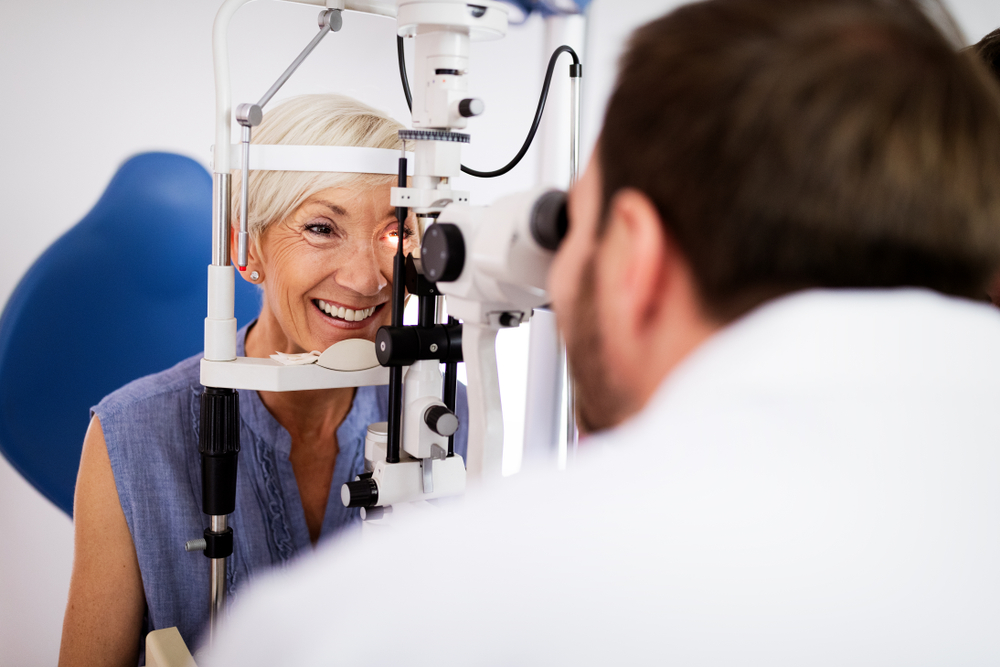
If you have had your vision restored with cataract surgery, you may find you have a new appreciation for the clarity of your vision! Once cataract surgery has restored your vision, it can be hard to imagine having to deal with the cloudy vision caused by cataracts again.
Keep reading to learn more about cataracts and if cataracts can return after cataract surgery!
What are Cataracts?
Cataracts occur when proteins in the eye start to break down and collect in clumps on the natural lens of the eye. Cataracts are most commonly the result of the eye’s natural aging process.

While the most common symptom of cataracts is cloudy vision, it can also affect clear vision in other ways. Some of the other symptoms of cataracts include difficulty seeing in low light and at night, sensitivity to bright lights and glare, seeing halos around sources of light, and frequent changes to your eye prescription.
While aging is an inevitable and the most common cause of cataracts, there are other factors that can increase the likelihood of developing cataracts earlier in life. These risk factors include an underlying health condition, like diabetes, a history of smoking, high blood pressure, previous eye injuries or eye surgeries, and prolonged exposure over time to sources of UV light.
Do you think you might be experiencing cataract symptoms?
How are Cataracts Treated?
The only way to effectively treat cataracts is with cataract surgery. Cataract surgery is safe and effective; it is also the most commonly performed eye surgery in the US.
During cataract surgery, the natural lens of the eye affected by cataracts is replaced with an artificial intraocular lens, also called an IOL. IOLs used in cataract surgery are made of high-quality plastic.
The new artificial lens will not be able to break down like the natural lens, so you won’t have to worry about ever developing cataracts again. However, some patients experience a return of the cloudy, blurry vision months or even years after successful cataract surgery.
The return of cataracts does not cause these symptoms. Instead, these port-surgery symptoms are most often caused by a condition called Posterior Capsular Opacification (PCO), which is also known as “secondary cataracts.”
What is PCO?
During cataract surgery, the artificial IOL is implanted in the eye to replace the natural lens. The new IOL is held in place by a thin membrane called the capsular bag, which is used to hold the natural lens.

This thin, transparent membrane is kept intact during cataract surgery in order to hold the replacement IOL in place. PCO occurs when a layer of scar-like tissue forms on the back of the lens capsule.
This scar tissue thickens and becomes cloudy, resulting in symptoms very similar to cataracts. Although it can be disappointing to see your pre-cataract surgery symptoms return, PCO is easily treatable.
How is PCO Treated?
The return of cataract-like symptoms is understandably upsetting for a patient who has had the clarity of their vision restored with cataract surgery. It can be reassuring to know that there is an effective treatment for PCO.

PCO is treated with a procedure called a posterior capsulotomy. It is a relatively quick and pain-free procedure that is most often performed in your eye doctor’s office in a single appointment.
During a PCO removal procedure, a special laser is used to remove the built-up scar tissue. Once the scar tissue is removed, the light previously blocked by the PCO can once again pass freely onto the retina, restoring normal vision function.
After the procedure, the quality of a person’s vision is usually fully restored. Most people who have PCO treatment are able to return to their regular activities immediately, and additional treatment for PCO is rarely required.
Are you experiencing symptoms of cataracts?
How Can I Prevent PCO?
The best ways to prevent PCO from developing after cataract surgery are by finding an experienced cataract surgeon and choosing a high-quality artificial IOL. It is also important to closely follow the postoperative instructions you receive from your eye surgeon.
When you allow your eye to heal properly, you are less likely to experience any short- or long-term complications following your cataract surgery. However, there is no guarantee that you won’t develop PCO at some point after cataract surgery.

While actual cataracts cannot return after successful cataract surgery, developing posterior capsular opacification can compromise your vision with cataract-like symptoms. If you find your vision is starting to get cloudy following your cataract surgery, you should let your eye care team know as soon as possible so that PCO can be effectively treated to protect the continuing clarity of your vision!
If you are experiencing the symptoms of cataracts, you don’t need to see the world through a cloud. Schedule a cataract evaluation at Northeastern Eye Institute in Scranton, Clarks Summit, Dallas, Forty Fort, Hamlin, Honesdale, Hazelton, Peckville, Montrose, Mountaintop, Pocono Summit, Tuckhannock, Wilkes-Barre, PA, today!